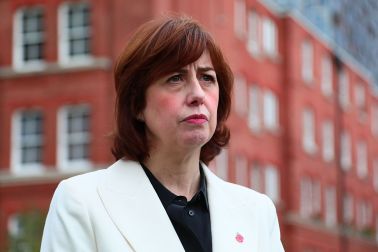Today’s energy bills announcement was the first really important moment of Liz Truss’s premiership so far – and may prove to be the most important one of her entire tenure. Kate has a run-down of the details of the policy here, but what the plan to freeze the average energy bill at £2,500 a year means politically is that there is a clear dividing line between the Truss government and Keir Starmer’s opposition – a line both of them are very happy to thicken.
A striking thing about Truss’s manner is that she goes headlong into the arguments of her opponents before they’ve even had a chance to raise them. So she told the Commons that ‘I can tell the House today that we will not be giving into the leader of the opposition who calls for a windfall tax’. Labour frontbenchers who’ve been watching her have already remarked on her desire to offer the reason for opposing something rather than just ridiculing the other side. She did also upbraid an opposition MP for laughing at a point she was making: ‘I don’t know why the hon. Gentleman is laughing. He is partly responsible for this.’ There were striking announcements too: Truss told the Commons that she wanted to make Britain a net exporter of energy by 2040 – an example of her desire to show that she’s not in office just to fix problems but to create lasting change.
Tory MPs who have spoken so far have been largely supportive – though Theresa May did call for the government to accelerate its transition to low carbon energy sources. The debate, though, was noisy, because Labour and other opposition parties were heckling throughout. Keir Starmer made the dividing line the entire theme of his speech, repeatedly saying that the ‘fundamental choice, the fundamental divide in this house’, was over how the tax was funded. ‘This is the basic political divide: they want to protect the excess profits,’ he said. ‘We want to protect working people.
‘Truss’s opening speech in the debate on the matter – unusual for a policy announcement which is normally a ministerial statement followed by questions from MPs to which the Prime Minister is obliged to respond – was preceded by a complaint from the Speaker. Lindsay Hoyle was angry that copies of the ministerial statement accompanying the announcement had only just been made available, calling it ‘discourteous to the House’. The Speaker had become increasingly infuriated by the Boris Johnson government’s attempts to dodge scrutiny and diminish parliament by announcing policies in the press first. He will be keen that Truss is not continuity Johnson in that respect at least.
It was frustrating that MPs could only give speeches in response, without any reply from the government frontbench until the planned summing up by the Business Secretary later. It means more details will have to wait. But it also made it more of a political event, suggesting Truss doesn’t see this announcement as merely something she has to do, but something she wants to campaign on too.








Comments